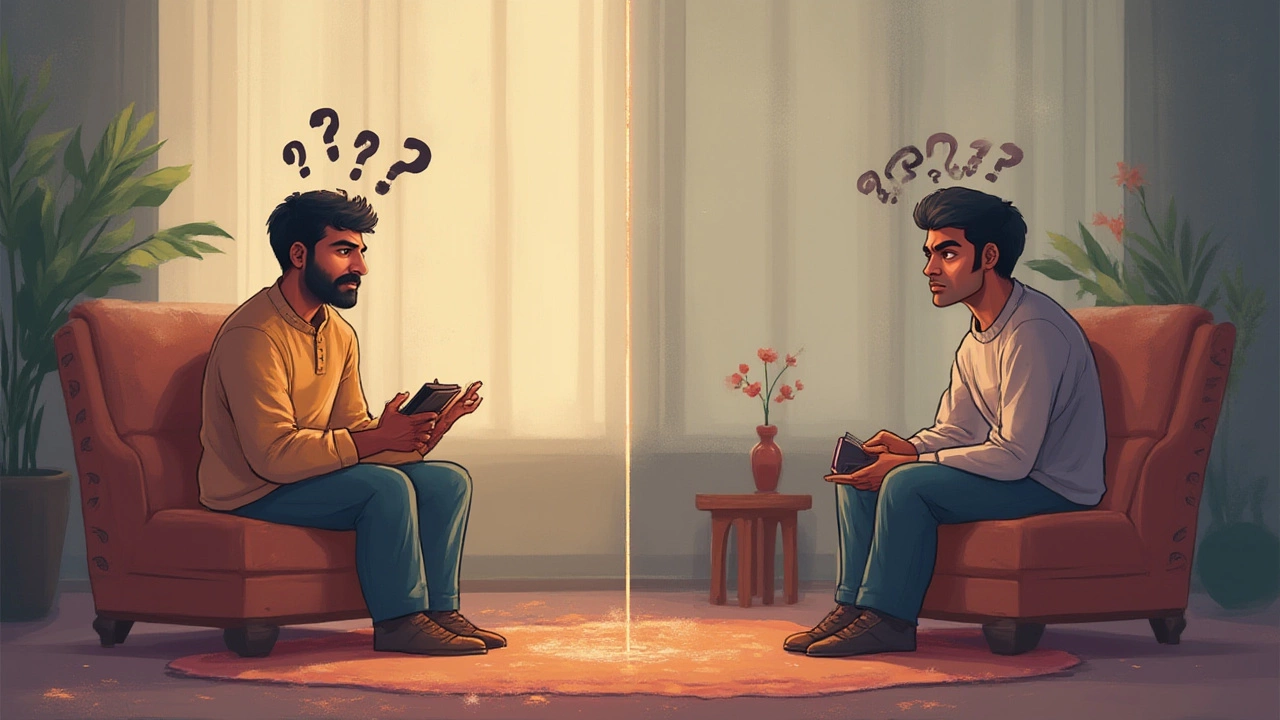Can You Share Too Much With Your Therapist? Boundaries and Benefits Explained
 Jul, 26 2025
Jul, 26 2025
Ever felt like your mouth ran ahead of your mind while talking to your therapist? One moment you're sharing about your bad week, the next you're spilling secrets you’ve never told anyone. Sounds familiar? You’re definitely not alone. There’s a real worry a lot of people have: can you actually overshare with your therapist? Most of us grew up with that little voice saying, “Don’t talk too much” or “Keep it to yourself.” Therapy tosses that rule out the window, but it doesn’t mean all bets are off. Everyone wants to get the most out of those safe, private therapy sessions, but at what point does “sharing” become “oversharing”? Let’s get into the nitty-gritty of the therapy room and talk through what’s really going on when you pull back, or when you let it all out—maybe a little too much.
Why Sharing is Key and How Oversharing Can Happen
When you start therapy, you feel that itch to hold back. Maybe you’re embarrassed. Maybe it’s a habit. But here’s the secret: therapy works best when you’re honest. Therapists aren’t mind readers, and they’re trained to help put your messy, complicated life into perspective. Still, people often wonder, "Am I talking too much? Am I dumping too much on my therapist?" This is pretty common—in fact, psychologists from University of Sheffield found that over 48% of people worry about overwhelming their therapist or looking "too much." The thing is, therapy isn’t regular conversation. You’re not at the pub or catching up at a family BBQ. Your therapist expects you to share things you’ve never said out loud before. That’s their job. Their entire training revolves around handling big emotions and deep personal stories—some messy, some dark, some weird.
So what’s oversharing then? It’s less about quantity and more about the “why.” If you’re flooding your therapist with every detail because you want to avoid the real issue, that’s actually emotional avoidance. According to London-based clinical psychologist Dr. Louise Goddard-Crawley, "Oversharing with a therapist often masks anxiety or a struggle to face bigger issues head-on." Sometimes, you might find yourself telling long-winded stories or going off-topic, using chatter to dodge painful truths or sidestep silence. Occasionally, folks share things impulsively and regret it afterward. This is especially true if you’re not used to opening up, if you have social or attachment anxiety, or if you grew up with strict privacy rules.
Here’s a twist: sometimes oversharing can become a pattern. If you launch into every little detail right away in the early sessions, your therapist may gently help you slow down. They do this for a reason—not because they’re tired of hearing you, but because therapy works best with a bit of pacing. There’s something called "therapeutic pacing," where the therapist matches the speed of digging deeper to what you can handle emotionally in the moment. If you blast past your own comfort, it might leave you feeling vulnerable, emotional, and even disconnected from your therapist once the dust settles.
There’s also the issue of feeling unsafe after oversharing. Ever walked home from a session thinking, "Why did I say that?" This can cause something called a "vulnerability hangover." Unlike your Sunday headache, this one is all about regret, shame, and worry. According to a 2022 BACP (British Association for Counselling and Psychotherapy) survey, 36% of clients reported feeling exposed or ashamed after sharing too much in one go. If this is you, you’re not odd and you’re not alone. Good therapists expect this to happen once in a while, especially as you build trust. They often help you recognize when you feel this way, and show you how to manage the emotional aftermath.
To help paint the picture clearer, here’s a little table showing how people typically feel after their therapy sessions, according to a survey by Mind UK in late 2024:
| Feeling after therapy | Percentage (%) |
|---|---|
| Relieved | 44 |
| Exposed / Over-shared | 36 |
| Confused | 12 |
| Empowered | 8 |
Sharing can absolutely be a double-edged sword. Without some thought, it can add stress. But don’t mistake temporary shame for a real problem. It’s part of the process sometimes—especially when you’re making breakthroughs and getting to the real heart of the matter.

What Therapists Expect and How They Manage Boundaries
So, do therapists ever think you’re 'too much’? The short answer is: rarely, if ever. Therapists in the UK and worldwide are governed by strict confidentiality and professional boundaries for a reason. Most have heard just about everything. If you worried your therapist would be shocked, the boring truth is, you’d probably have to seriously go out of your way to say something they haven’t come across before. According to the United Kingdom Council for Psychotherapy, nearly all therapists receive training in trauma, crisis intervention, and taboo topics. If your therapist ever looked visibly shocked, it’s more likely they’re concerned for your safety, not judging what you just told them.
Therapists do have their own boundaries though. Their job isn’t just to listen, it’s to help guide you. If they feel your sharing is getting in the way of progress, they’ll tell you respectfully. Sometimes, oversharing is a way of testing boundaries or seeing how much you’re ‘allowed’ to say. A good therapist will spot this and help you unpack what’s underneath. If you talk in circles about unrelated things every session, your therapist might steer you back with phrases like, “I notice we talk about your work a lot, but you mentioned having trouble sleeping—shall we explore that?” That’s them keeping things on track, not shutting you down.
If you’re worried about sharing too much, try to remember therapy isn’t a one-way street. You’re not just emptying out your worries with no response. It’s about building a relationship, at a pace you’re both comfortable with. Dr. Julie Smith, bestselling therapist and author, summed it up like this:
“Therapy works at the speed of trust. Your job is not to shock your therapist, but to be honest at the pace you can bear. Good therapists won’t rush you or push you to reveal things before you’re ready.”
One helpful tip: Think about what you hope to get out of each session. If you find yourself spilling random stories, try jotting down a few main points you want to talk about. But don’t censor yourself too much—sometimes what you didn’t plan to say turns out to be the breakthrough moment. Keep in mind, therapists are also expert at handling strong emotions. You won’t “break” the therapist. If things do feel too intense or confusing, there’s no shame in saying, “I think I said more than I meant to.” This can turn into a powerful opportunity to explore why and learn about your own needs and boundaries.
What about when family, friends, or partners ask what you talk about in therapy? You owe them nothing. Therapy is your space, full stop. You don’t have to report back or justify what you share. According to Mind UK, nearly 1 in 5 people say they’re asked by family members to disclose details from therapy, which usually adds pressure rather than helps. Setting boundaries outside therapy is just as crucial as inside.
Therapists also have limits on what they can do with your information. Confidentiality is part of the contract. In the UK, a therapist can only break confidentiality if they believe you or someone else is at risk of serious harm, such as suicide or abuse. Even then, they typically explain what’s happening and why. Your privacy is one of the core principles of good therapy practice, and nothing you say is going to reach anyone else without proper reason.

Making the Most of Your Therapy: Practical Tips for Sharing
So, you’re in therapy, and you’re still not sure how much to share? Here are some practical tips to help you figure it out:
- Start with what feels most real or immediate. If you’re walking into a session feeling anxious or guilty for something you said before, tell your therapist. Honesty about your own process is more important than any particular story.
- Pay attention to your gut. If you feel nervous to share something, that’s often a clue it’s emotionally important. Name that feeling out loud. Your therapist will likely help you get to the heart of it together.
- If you find yourself rambling or giving too many details, pause and ask yourself: is this helping the conversation? Is it dodging a harder truth?
- Write down emotions or key events before your session. A lot of people use therapy journals for this. It helps stop the “I forgot what I was going to say” moment and keeps sessions productive.
- Challenge any shame or embarrassment. Remind yourself: this is literally what therapy is for. If you feel shame after a session, bring it up next time. Working through the shame is often a big part of getting better.
- If you ever regret sharing something, you can ask your therapist to talk about it, or even request they don’t write it in your record. Ethically, therapists in the UK are allowed to hold back things from the notes that aren’t relevant to your care, if you request it.
- Remember, you’re not responsible for “entertaining” your therapist or making sessions interesting. It’s not a performance. It’s real talk, for your own growth.
There’s also nothing wrong with saying, “I don’t want to talk about this right now.” Or asking, “Do you think we’re focusing on the right stuff?” It’s a partnership, not a confession booth.
If you’re worried about trauma dumping—that is, unloading very emotionally intense material all at once—sometimes pacing can help. Not every scar needs to be shown on day one. Break up your story. Give your therapist time to respond and you more space to breathe. Qualified therapists expect this process to take time. They have their own networks and supervisors to make sure they get the support they need—so they don’t burn out or hold onto your pain between sessions.
And if you’re anxious about how you come across, remember this: nearly every single person in therapy fears they are “too much.” Sharing your truth, even in all its chaotic, messy detail, is often what makes therapy work. Not all of it will be pretty. But it will always be human. Just like you. Therapy is the one place where the more real you are, the more you can actually heal.